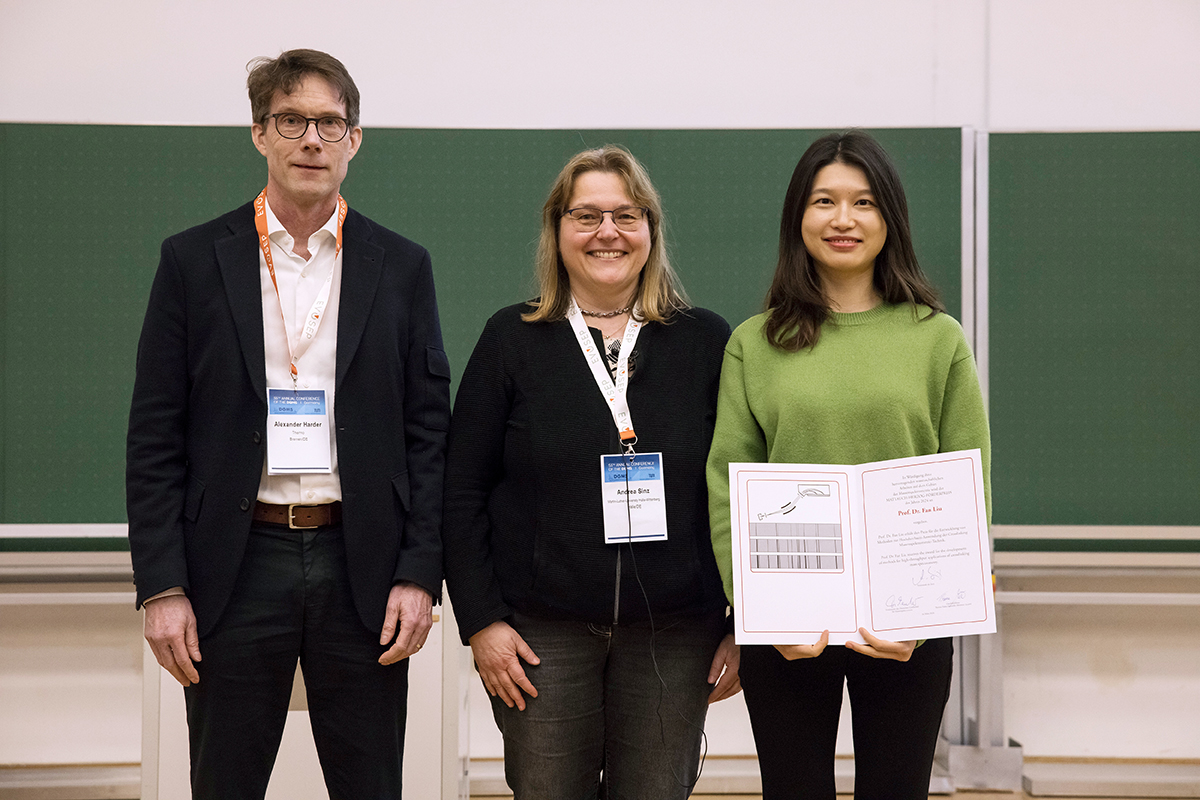Your selection
Research / 09.04.2024
The Protein Expert

Prof. Dr. Fan Liu from the Leibniz-Forschungsinstitut für Molekulare Pharmakologie (FMP) has recently received several awards for her contributions to the field of cross-linking mass spectrometry. The scientist is dedicated to better understanding the interactions between proteins at the cellular level. Additionally, she is developing methods and standards to refine this complex and indispensable technology for many research questions, making it more broadly applicable.
A lot is already known about the processes in human cells, but this knowledge is insufficient to understand, for example, how neurodegenerative diseases originate and can be cured. "To counteract diseases, we first need to know exactly how the cell functions in its normal state," says FMP researcher Prof. Dr. Fan Liu.
The biologist specializes in analyzing the interactions of proteins in cells. Such protein-protein interactions (PPI) underlie nearly all cellular processes. Deciphering them is crucial to understand the regulatory mechanisms of the cell under physiological and pathological conditions. Fan Liu and other researchers worldwide use cross-linking mass spectrometry (XL-MS) for this purpose. It is the only technology currently available that can both reveal the identities of interacting proteins and localize their binding interfaces. Additionally, XL-MS provides information about the three-dimensional structures of proteins.
Since 2017, Fan Liu has been the head of the "Structural Interactomics" research group and the Mass Spectrometry technology platform at FMP, and she also holds a professorship for Structural Interactomics at the Charité. She is working on developing new XL-MS methods and applying them to highly complex biological samples. Her goal is to gain more comprehensive insights into the naturally occurring three-dimensional structures and interactions of proteins in a cell, to better understand its general biological state and the cellular processes that are currently active.
Until a few years ago, XL-MS experiments were limited to simple mixtures of purified proteins, but they can now provide deep insights into the cellular proteome and interactome – the totality of proteins and PPI within a cell. Fan Liu has made significant contributions to this dramatic improvement: "I have developed several key methods for proteome-wide XL-MS studies and new applications that enable unprecedented insights into various complex biological systems," she says. This includes a workflow that significantly accelerates the identification of thousands of cross-links in intact human cells, with a much larger number of proven PPIs. Fan Liu and her team have also developed approaches for standardization and quality assurance in XL-MS, as well as software solutions for automatic analysis and visualization of XL-MS data.
For these diverse achievements, Fan Liu received together with Dr. Jonas Warneke from the University of Leipzig the Mattauch-Herzog Sponsorship Award in March 2024, presented by the German Society for Mass Spectrometry (DGMS) and endowed with 12,500 euros. "I am very pleased that my work in the field of XL-MS has been recognized. My goal is to provide better access to cellular data across numerous biological fields and to translate this information into useful applications," says Fan Liu about the award.
Back in January, the FMP researcher had already been named one of the "2024 Rising Stars in Proteomics and Metabolomics" by the Journal of Proteome Research (JPR) of the American Chemical Society. A few weeks later, she and Patrik Verstreken from the Leuven Brain Institute received a Collaborative Pairs Pilot Project Award from the Neurodegeneration Challenge Network (NDCN) of the Chan Zuckerberg Initiative. The researchers aim to study the interactions between synaptic proteins of hibernating animals to better understand how hibernators counteract the permanent loss of synapses. Through this, Fan Liu and Patrik Verstreken hope to gain insights into how synapse loss in human neurodegenerative diseases can be mitigated.
Source: Press Release at the website of the Leibniz-Forschungsinstitut für Molekulare Pharmakologie (FMP): The Protein Expert
Overview News
News Buch Berlin
The Imaging Innovation Center hits a milestone
The Max Delbrück Center, Berlin, celebrates its new, innovative research building with a “topping-out ceremony.” The Imaging Innovation Center, designed by the architectural firm heinlewischer, will h...
more ...Giant with a Ceramic Heart
A new NMR spectrometer has been in operation at the Leibniz-Forschungsinstitut für Molekulare Pharmakologie (FMP) since the end of May.
more ...Holger Gerhardt new member of the DZHK Board of Directors
Professor Holger Gerhardt from the DZHK partner site Berlin was newly elected to the Board of Directors by the General Assembly: He will take office on 1 July 2024.
more ...Events Buch Berlin
17.08.2024, 21:15
Open Air Sommerkino in Hobrechtsfelde: "Dirty Dancing"
Kultfilm von 1987
more ...10.09.2024, 09:00
From Target to Market - The GLA Biotech & Pharma Summer School
The 4-day intensive course provides a comprehensive overview of the entire drug development process in biotechnology and in the pharmaceutical industry – from the idea to the market.
more ...12.09.2024, 09:00
Realtime PCR und digital PCR Kurs
Der RealTime PCR und Digital PCR Kurs richtet sich an erfahrene PCR Anwender*innen und an Einsteiger*innen. Wichtige PCR Grundlagen werden erörtert, bevor die RealTime PCR besprochen und Genexpression...
more ...







